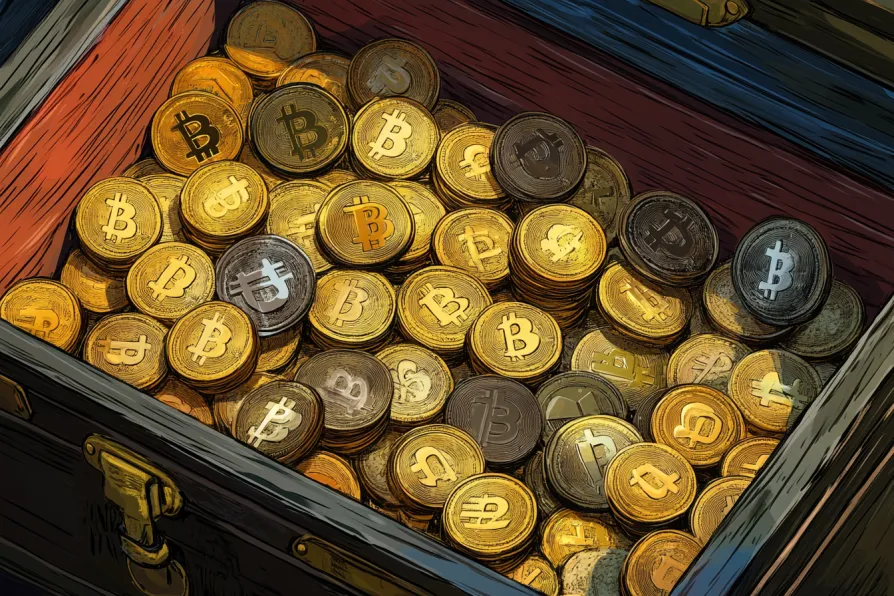Crypto's Fast-Changing Landscape Brings New Highs Into Focus



Bitcoin is longing for new highs, but something has stymied that since it hit a new all-time high of above $111,000 recently.
The original intention behind Bitcoin was to provide a medium of exchange for value preservation during uncertain times, particularly when fiat currencies were losing ground.
Many thought that the entry of large-scale investors would set the stage for a surge in the Bitcoin/USD exchange rate.
The truth is that Bitcoin fell below the psychologically critical $100,000 threshold over the weekend, despite rising interest from big participants in digital assets and amid the Israel-Iran conflict.
From 600,000 to 700,000 in 2024 to 500,000 in 2025, the number of daily Bitcoin network transactions has dropped, according to Glassnode. Additionally, every day, tokens with a value of more than $7 billion are exchanged.
Large institutional investors are getting involved in the market because transaction sizes are getting bigger. Another piece of evidence for this is the $131 billion that has poured into Bitcoin exchange-traded funds (ETFs) since their inception in January 2024.
The derivatives market has transacted a staggering $96 billion.
Patterns in the volume of transactions in Bitcoin and the fall in price in the face of rising Middle Eastern geopolitical tensions may not be shocking given the asset's reputation for risk.
It is fascinating to observe, nevertheless, that the rate of depreciation for BTC/USD and the S&P 500 is different.
Before the US attacks on Iran's nuclear facilities, the broad stock index frequently disregarded threats, whereas Bitcoin responded delicately to every escalation.
Some in the market believe that nations subject to Western sanctions pose a significant threat to cryptocurrency due to their heightened sensitivity. Many also think these countries are trying to get rid of their Bitcoin holdings because they aren't able to sell their traditional assets. As a result, the price of Bitcoin/USD falls as the supply of tokens rises.
Geopolitical events usually only temporarily affect the market value of different assets. As an example, the price of oil and US stock indices went through huge fluctuations during the First and Second Gulf Wars.
After a while, the S&P 500 and Brent crude both went back to where they had been. The aftermath of the Israeli-Iranian war mirrors those past events.
The OG token is back up up above $108,000.
The descendants of the Persians delivered only symbolic retaliation, turning investor interest into crypto.
Landscape of Bitcoin Transforming
Bitcoin is experiencing rapid and unprecedented terrain transformation. There is evidence of advanced portfolio management and developing custodial procedures in Tesla's recent move of all 11,509 BTC ($770M) to new digital addresses.
At the same time, corporate conviction is only growing as Metaplanet plans to inject its US businesses with multi-billion-dollar money to speed up Bitcoin acquisition.
Cryptocurrency is becoming mainstream, according to surveys by Charles Schwab and others.
These days, diverse portfolios can't do without it. The increasing legitimacy and general acceptance of digital assets are highlighted by high-profile actions, such as the Trump family's entry into Bitcoin mining and political figures openly debating them.
Some Milestones & Headlines
Over 725,000 BTC are now in the possession of public businesses, a 135% rise from 2024.
Corporate holdings have surpassed 1 million BTC, with an additional 300,000 BTC held by private entities. That's comparable to the reserves of certain sovereigns.
With net inflows surpassing $13.75 billion YTD, BlackRock's iShares Bitcoin Trust (IBIT) just witnessed a record $1.23 billion inflow in June. IBIT became the first ETF ever to achieve $70 billion in assets under management (AUM), faster than the Spyder Trust (SPY), gold (GLD), and Invesco QQQ Trust (QQQ).
Bitcoin breaks into billion-dollar family offices, with 74% of family offices with $1 billion or more in assets looking into Bitcoin, says BNY Mellon. Generational capital is silently moving from observing to allocating strategically.
Following its merger with Columbus Circle Capital 1, Anthony Pompliano-led ProCapBTC successfully raised $750 million in equity and convertible debt . So, what's the point? The company has acquired Bitcoin on a significant scale, established a public structure, and gained extensive access to investors.
Texas has become the first US state to create a Bitcoin reserve, which was a watershed moment for the cryptocurrency's official acceptance.
Some senior executives in the industry, such as Scott Bessent, have even gone so far as to say that Bitcoin might act as a link between the current fiat system and the future of digital currencies.
How Global Powerhouses Are Responding
United States : The popularity of Bitcoin is growing, even in the nation's capital. The approval of spot Bitcoin ETFs allowed institutional investors to enter the market without actually owning Bitcoin.
Clients can even get exposure to Bitcoin through financial institutions like JPMorgan.
Germany : A European country that is leading the way in cryptocurrency. Bitcoin has strong legal standing as a unit of value, and financial institutions can lawfully store crypto assets.
Singapore : Managing innovation and regulation is a balancing act for Singapore, a world leader in fintech. Wealth portfolios are incorporating Bitcoin, while the MAS (Monetary Authority) is formulating guidelines to ensure the cryptocurrency's safe adoption.
Switzerland : Several cantons accept Bitcoin as a form of tax payment, regulated exchanges like SIX Digital Exchange facilitate Bitcoin transactions, and crypto-friendly institutions further integrate Bitcoin into the financial system. A legitimate crypto-financial research facility.
El Salvador : The most daring step thus far, recognizing Bitcoin as legal money. This controversial, yet necessary, event has spurred the global debate about Bitcoin's role in financial sovereignty and remittance innovation.
The main reason Bitcoin has surged beyond $100,000 is now its widespread acceptance by governments and other institutional investors.
Bitcoin is seeing its function in the international monetary system reimagined in real-time as it gains acceptance from corporate treasuries, ETFs, and even sovereign funds.
Elsewhere
Blockcast
The Intersection of AI & Blockchain Technology ft. Node Foundry
This week, host Takatoshi Shibayama explores the intersection of AI and blockchain technology with guests Abhinav Ramesh and Vinay Mohan, co-founders of Node Foundry . The conversation covers their backgrounds in crypto, current adoption challenges, and the potential of decentralized AI infrastructure to address rising compute costs.
Central to the discussion is Node Foundry's approach as "a two-sided marketplace" that simplifies access to decentralized AI solutions. The guests emphasize their goal to "abstract away the complexity of Web3" while maintaining privacy and security for enterprise users. As they highlight, the cost of compute is getting very expensive, but decentralized infrastructure can provide cheaper alternatives to traditional centralized models.
Blockcast is hosted by Head of APAC at Ledger, Takatoshi Shibayama . Previous episodes of Blockcast can be found here , with guests like Davide Menegaldo (Neon EVM), Jeremy Tan (Singapore parliament candidate), Alex Ryvkin (Rho), Hassan Ahmed (Coinbase), Sota Watanabe (Startale), Nic Young (Oh), Jacob Phillips (Lombard), Chris Yu (SignalPlus), Kathy Zhu (Mezo), Jess Zeng (Mantle), Samar Sen (Talos), Jason Choi (Tangent), Lasanka Perera (Independent Reserve), Mark Rydon (Aethir), Luca Prosperi (M^0), Charles Hoskinson (Cardano), and Yat Siu (Animoca Brands) on our recent shows.

Blockhead is a media partner of Coinfest Asia 2025. Get 20% off tickets using the code M20BLOCKHEAD at https://coinfest.asia/tickets .

Kraken Secures MiCA License from Ireland's Central Bank
The exchange is the first major global crypto platform to receive authorization in Ireland under the...

Metaplanet Overtakes Tesla as Fifth Largest Corporate Bitcoin Holder
Japanese firm adds 1,234 BTC for $132.7M following $515M equity raise, achieving 315% BTC yield year...

Dollar Weakness, Policy Shifts Drive Institutional Acceleration
Your daily access to the backroom....

